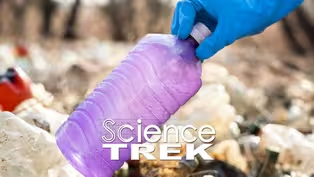
Garbage: Decomposers and Decay
Clip: Special | 1m 4sVideo has Closed Captions
What is a decomposer?
There are lots of factors in how quickly organic material decomposes into compost, including creatures called decomposers. Find out what kind of things are part of nature’s clean-up crew.
Problems playing video? | Closed Captioning Feedback
Problems playing video? | Closed Captioning Feedback
Science Trek is a local public television program presented by IdahoPTV
Major Funding by the Laura Moore Cunningham Foundation and the Idaho National Laboratory. Additional Funding by the Friends of Idaho Public Television and the Corporation for Public Broadcasting.

Garbage: Decomposers and Decay
Clip: Special | 1m 4sVideo has Closed Captions
There are lots of factors in how quickly organic material decomposes into compost, including creatures called decomposers. Find out what kind of things are part of nature’s clean-up crew.
Problems playing video? | Closed Captioning Feedback
How to Watch Science Trek
Science Trek is available to stream on pbs.org and the free PBS App, available on iPhone, Apple TV, Android TV, Android smartphones, Amazon Fire TV, Amazon Fire Tablet, Roku, Samsung Smart TV, and Vizio.

Science Trek
Science Trek is a place where parents, kids, and educators can watch short, educational videos on a variety of science topics. Every Monday Science Trek releases a new video that introduces children to math, science, technology, engineering, and math (STEM) career potentials in a fun, informative way.(Science Trek music) JOAN CARTAN-HANSEN, HOST: There are several factors in how quickly organic garbage decomposes, that is turns back into soil.
Things like how dense the material is, how thick and how big.
The weather plays a big role in the decaying process.
Water, oxygen, and the warmth of the sun speeds up decay.
And the decaying process needs decomposers.
Decomposers are organisms that eat biodegradable matter.
They're called nature's clean-up crew.
Scavengers like vultures, rats and termites feed on dead animals and trash.
Detritivores, like earthworms, flies and Dung beetles eat dead plants, animal waste and organic material.
Then there are decomposers like fungi and bacteria.
They break down the waste and remains of living material.
The byproduct of this decay is called compost.
It gets mixed into the soil, adding lots of nutrients.
Decomposers don't just deal with waste on the ground.
Some help clean water by filtering it and absorbing the nutrients.
For more information about garbage, check out the Science Trek website.
You'll find it at ScienceTrek.org
Garbage: How Long Will It Last?
Video has Closed Captions
Clip: Special | 1m 4s | How long does a glass bottle last in a landfill? (1m 4s)
Providing Support for PBS.org
Learn Moreabout PBS online sponsorship
- Science and Nature

Explore scientific discoveries on television's most acclaimed science documentary series.

- Science and Nature

Capturing the splendor of the natural world, from the African plains to the Antarctic ice.












Support for PBS provided by:
Science Trek is a local public television program presented by IdahoPTV
Major Funding by the Laura Moore Cunningham Foundation and the Idaho National Laboratory. Additional Funding by the Friends of Idaho Public Television and the Corporation for Public Broadcasting.
